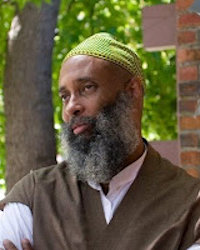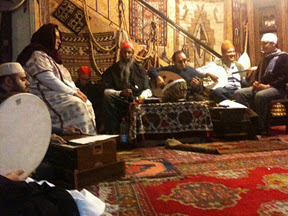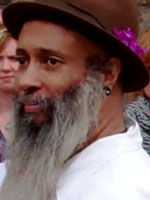
Dr. Ibrahim Farajajé Oral History
Part 1:
Part 2:
→ Transcript of Ibrahim Farajajé’s interview.
Biography
Dr. Ibrahim Farajajé (formerly Elias Farajajé-Jones) is a pioneer who has worked to help faith communities of color create compassionate responses to the HIV/AIDS pandemic. He was born to a mixed racial heritage family in Berkeley, California, and his youth was spent in a religiously pluralistic, diverse mixed-class neighborhood. His parents were education activists who encouraged his educational excellence which led to him learning numerous languages at a young age (he currently speaks/reads 16 languages). Although exposed to Christianity and Judaism, he encountered Islam in boarding school and organized a religion club that would visit numerous religious communities. He was taught at an early age that all paths lead to God and has maintained an openness to religion that is expressed in his current work on multi-religious theological education. His boarding school also exposed him to queer studies in a positive way and his early consciousness was untainted by negative associations of gay, lesbian, bisexual, or transgender persons. Farajajé graduated from his boarding school in 1969 at the age of 16 and enrolled at Williams College where he later transferred to Vassar College and was among the first black male students there.
 While a student at Vassar he participated in a survey on sexuality where he was given several categories to identify as, and he recognized that the term bisexual came closest to what he was theoretically experiencing. He celebrated the playfulness of his sexuality and contemporarily does not like the term bisexual because of its binary nature which he feels confines him to an identity when he is more than one identity formation. He had relationships spanning genders as well as across gender lines, and even though he is labeled as an openly bisexual black queer activist he prefers no label other than he’s a “full human being” that embraces all.
While a student at Vassar he participated in a survey on sexuality where he was given several categories to identify as, and he recognized that the term bisexual came closest to what he was theoretically experiencing. He celebrated the playfulness of his sexuality and contemporarily does not like the term bisexual because of its binary nature which he feels confines him to an identity when he is more than one identity formation. He had relationships spanning genders as well as across gender lines, and even though he is labeled as an openly bisexual black queer activist he prefers no label other than he’s a “full human being” that embraces all.
This comfort with fluidity is also reflected in his academic and activist passions as he has been trained across a spectrum of religious beliefs. He has a Masters of Divinity degree from St. Vladimir’s Eastern Orthodox Seminary in New York and a Doctorate in Theology from the University of Bern in Switzerland. He worked for the World Council of Churches and after receiving his doctorate he immediately began teaching at Howard Divinity School in January 1986.
 After arriving in Washington, D.C., he experienced a synergy of his life as artist, activist, academic, and spiritual leader through the lens of the HIV pandemic. He was the first scholar to address HIV as a religious and theological case noting the ethical imperative to respond to the crisis. He developed a course for Howard Divinity School on how African American religious leaders should respond to the HIV crisis in their communities as well as a gospel performance piece that addressed black communities that refused to bury those who had died from AIDS- related complications. He also served as the initial faculty advisor for the Oxala, Howard University’s LGBT student group. Ibrahim was very active in ACT UP D.C., the chair of the Political Action Committee for the DC Black Queer Coalition, a founding member of the Alliance of Multi-Cultural Bisexuals (AMBi), and founder of the first bi group for men of color in D.C named Moving Violations that was focused on direct action around the AIDS crisis from a pro-feminist, mujerista, and womanist perspective. His article "Invocation of Remembrance, Healing and Empowerment in a Time of AIDS" was published in "Equal Rites: Lesbian and Gay Worship, Ceremonies, and Celebrations" (Westminster/John Knox Press, 1995). After ten years of activism and academic enrichment at Howard Divinity School, Ibrahim returned to California and took a faculty position at the Graduate Theological Union, Starr King School for the Ministry in Berkeley, CA.
After arriving in Washington, D.C., he experienced a synergy of his life as artist, activist, academic, and spiritual leader through the lens of the HIV pandemic. He was the first scholar to address HIV as a religious and theological case noting the ethical imperative to respond to the crisis. He developed a course for Howard Divinity School on how African American religious leaders should respond to the HIV crisis in their communities as well as a gospel performance piece that addressed black communities that refused to bury those who had died from AIDS- related complications. He also served as the initial faculty advisor for the Oxala, Howard University’s LGBT student group. Ibrahim was very active in ACT UP D.C., the chair of the Political Action Committee for the DC Black Queer Coalition, a founding member of the Alliance of Multi-Cultural Bisexuals (AMBi), and founder of the first bi group for men of color in D.C named Moving Violations that was focused on direct action around the AIDS crisis from a pro-feminist, mujerista, and womanist perspective. His article "Invocation of Remembrance, Healing and Empowerment in a Time of AIDS" was published in "Equal Rites: Lesbian and Gay Worship, Ceremonies, and Celebrations" (Westminster/John Knox Press, 1995). After ten years of activism and academic enrichment at Howard Divinity School, Ibrahim returned to California and took a faculty position at the Graduate Theological Union, Starr King School for the Ministry in Berkeley, CA.
 In his time at Starr King, he directed a major project on multi-religious theological education, and took on additional leadership roles such as Department Chair of Islamic Studies, Dean of Faculty, Senior Vice President of Academic Affairs, Provost, and Acting President. Although his academic work has dealt with an eclectic terrain of religious traditions, personally, he felt an urge to reconnect with Sufi Islam and began attending a Sufi mosque in 2001. He began embracing himself as a mystic activist, which causes him to spend part of the year living and meditating in Turkey, India, and Berkeley, California.
In his time at Starr King, he directed a major project on multi-religious theological education, and took on additional leadership roles such as Department Chair of Islamic Studies, Dean of Faculty, Senior Vice President of Academic Affairs, Provost, and Acting President. Although his academic work has dealt with an eclectic terrain of religious traditions, personally, he felt an urge to reconnect with Sufi Islam and began attending a Sufi mosque in 2001. He began embracing himself as a mystic activist, which causes him to spend part of the year living and meditating in Turkey, India, and Berkeley, California.
Ibrahim’s spiritual practices are very important to him as is his commitment to activism that highlights the intersections of oppression and how they work to silence and erase persons’ humanity. He takes joy in being the father of a marvelous child, and in his role accompanying people who are dying and preparing their bodies for burial. In this role, he gets to be the last religious message for people bringing a message that is positive and affirming. Finally, he is grateful for the opportunity to provide people with another way of thinking that has brought tangible change in a variety of communities.
Ibrahim suffered a heart attack on January 15, 2016 and died on February 9th.
(This biographical statement written by Monique Moultrie from information provided by Dr. Ibrahim Farajajé.)
Biography Date: February, 2014
Additional Resources
Profiles:
Tags
Islam | Black | AIDS | Author/editor | Bisexual activism | Racism | Theology | Farajaje, Ibrahim
Citation
“Dr. Ibrahim Farajajé | Oral History”, LGBTQ Religious Archives Network, accessed February 22, 2026, https://lgbtqreligiousarchives.org/oral-histories/ibrahim-farajaje.